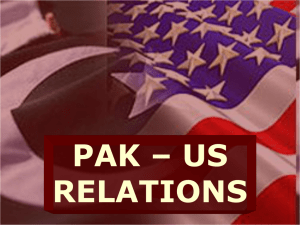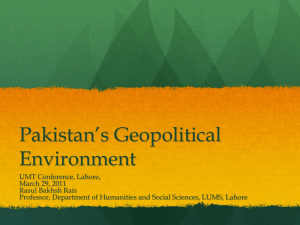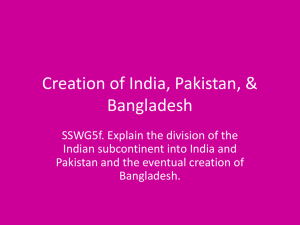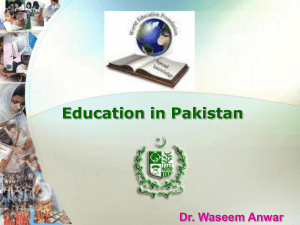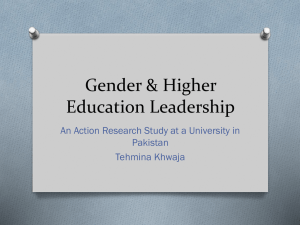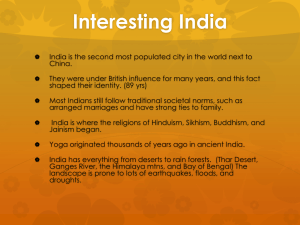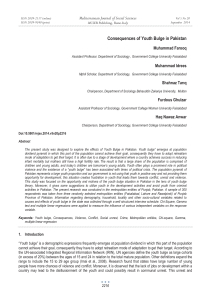File
advertisement
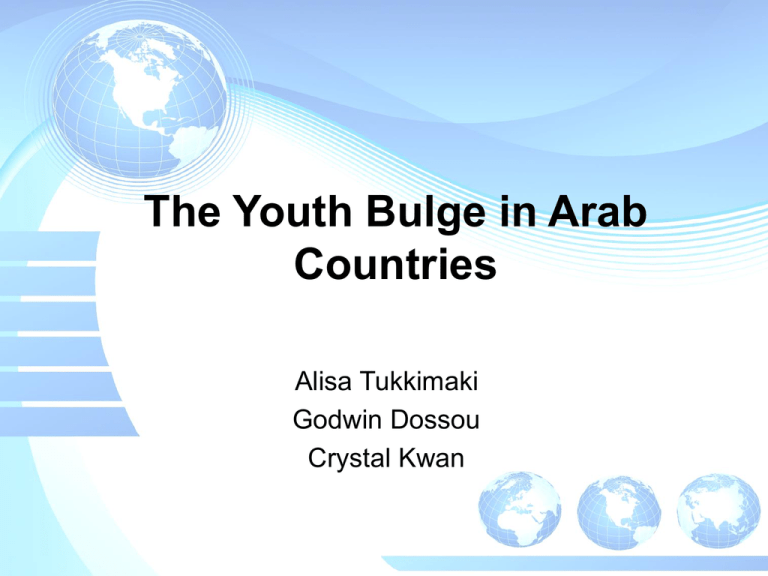
The Youth Bulge in Arab Countries Alisa Tukkimaki Godwin Dossou Crystal Kwan Some Definitions Young Population: A population with the percentage of ages 1–14 over 30% and ages 75 and above under 6% is considered a "young population`` Aging Population: • A population with the percentage of ages 1-14 under 30% and ages 75 and above over 6% is considered an "aging population" Source: http://en.wikipedia.org/wiki/Population_pyramid#Young_and_ageing_populations The Youth Bulge Theory • `…an excess in especially young adult male population predictably leads to social unrest, war and terrorism as the "third and fourth sons" that find no prestigious positions in their existing societies rationalize their impetus to compete by religion or political ideology.`` • A German sociologist and economist named Gunnar Heinsohn developed this theory • ``Heinsohn claims that most historical periods of social unrest lacking external triggers (such as rapid climatic changes or other catastrophic changes of the environment) and most genocides can be readily explained as a result of a built up youth bulge, including European colonialism, 20th century Facism, and ongoing conflicts such as that in Darfur, The Palestinian uprisings in 1987-1993 and 2000 to present, and terrorism.`` • Proponents of the theory: U.S. Political Scientist Jack Goldstein (the new population bomb), U.S. Political Scientist Gary Fuller Source: http://en.wikipedia.org/wiki/Population_pyramid#Youth_bulge Changes in Global Demography •Population aging at unprecedented rates in developed countries: ``In 2050, approximately 30 percent of Americans, Canadians, Chinese, and Europeans will be over 60, as will more than 40 percent of Japanese and South Koreans.`` Source: Goldstone, J. (2010). The new population bomb: the four megatrends that will change the world. Foreign Affairs, 89(1): 31-43. •The concentration of the global youth population in developing countries: •developing countries have the highest birthrates •As stated by UN Secretary-General in his Millennium Report, “More than 1 billion people are between the ages of 15 and 24. Nearly 40 % of the world’s population is below the age of 20.Most of the resulting youth bulge, nearly 98%, will occur in the developing world” Source: http://www.un.org/millenniumgoals/pdf/MDG%20Report%202010%20En%20r15%20-low%20res%2020100615%20-.pdf Arab Countries: “Youthful Societies” Youth Population •2005: totaled 65,680 million •2015: projected to increase to 71,704 million •2025: and then to 79,452 million ``It is envisaged that this increased population in the young age of 15-24 in the overall population resulted in the most rapid growth in the number of young people in the region’s history.`` Source: http://www.escwa.un.org/divisions/div_editor/Download.asp?table_name=divisions_news&field_name=ID&FileID=682 The Big Question: So What? How does the increasing high concentration of the global youth in Arab countries influence international social policy? A Left Perspective: A look at Pakistan “While Pakistan’s bloated youth cohort and a noticeable desire among young men to attain education and find respectable livelihoods could act as an agent for positive change in ideal circumstances, a proactive and multi-faceted policy approach is required to generate desirable outcomes.” (Brookings Institute) A Left Perspective: A look at Pakistan Factors within Pakistan society that increase potential for youth radicalization: •poor education system •highly stratified socio-economic lines •disparate economic opportunities across segments of society •presence of an extremist infrastructure •impeccable organizational discipline •widespread social networks of Pakistan’s Islamic political and militant outfits •A failure of the moderate forces to deliver credible results •myopic U.S. policies further enhance Islamist influence Source:http://www.brookings.edu/papers/2008/10_pakistan_yusuf.aspx A Left Perspective: A look at Pakistan “Given Pakistan’s strategic importance and its potential to disrupt South Asian peace, the international community has a high stake in ensuring a positive turnaround.” (Brookings Institute) A Left Perspective: A look at Pakistan U.S. policy intervention for Pakistan should include: •Focusing on Pakistan’s educational system: •“Enhancing the quality of Pakistan’s public education rather than retaining a disproportionate focus on the madrassah system.” •“Intervening in terms of the educational content, with modest agenda of simply returning the textbook contents to the pre-Islamization period.” •“Making socio-economic aid conditional upon Pakistan’s ability to spread benefits to the masses instead of tying it solely to terrorism.” •“Revising U.S. visa and immigration policies for young Pakistanis in order to provide them with a constructive outlet, perhaps through a formal protocol that allows disproportional access to young Pakistani citizens belonging to lower socio-economic classes.” •“Consciously attempting to expose young Pakistanis to U.S. culture by reopening information and cultural centers throughout Pakistan” A Perspective from the Centre: The Economic and Social Commission of Western Asia (ESCWA, division of the UN) “The age structure of the Arab population is changing, thus ensuring the emergence of what has been termed the ‘Youth Bulge’…It is envisaged that this increased population in the young age of 15-24 in the overall population resulted in the most rapid growth in the number of young people in the region’s history…Managing this increase… will be an enormous challenge for Arab governments, and the economic, social and political consequences of failing to do so could be serious.” (ESWCA, 2008) A Perspective from the Centre: The Economic and Social Commission of Western Asia (ESCWA, division of the UN) Two Opposing Views The youth bulge is a “demographic gift,” the large number of youth is seen as an asset, for political and social opportunities The youth bulge is a problem in this region, having negative political and social implications A Perspective from the Centre: The Economic and Social Commission of Western Asia (ESCWA, division of the UN) Policy Recommendations: • Integrate youth in development programs Example: World Programme of Action on Youth (WPAY) •Focus on International Migration and Development •Knowledge and skill building in the Arab region in the area of demographic analysis Example: “Methods of Integrating Demographic transition in Development Plans and Programmes in Arab regions” A Right Perspective: The World Bank and IMF “Countries with younger populations are more prone to civil unrest and less able to create or sustain democratic institutions” – Richard Cincotta A Right Perspective: The World Bank and IMF The Concerns: Unemployment: its impact on local and global economies and markets Social Social Dislocation: Dislocation:its its relationship relationshipwith with conflict conflict A Right Perspective: The World Bank and IMF • Youth unemployment rate may be four times the adult rate in some countries • Many countries have no way to employ these youth or absorb them into the labour market • A drain on all local systems • Most youth do not have access to primary education • Raising instability within local/international labour market is increasing the risk of political and social turmoil. Source: http://web.worldbank.org/WBSITE/EXTERNAL/COUNTRIES/MENAEXT/MOROCCOEXTN/0 A Right Perspective: The World Bank and IMF Social Dislocation • Conflict and instability greatly impact youth prospects • Youth may play a key role in the instability • Enormous impact on international relations, foreign aid, investments, government spending and global markets. Source: http://web.worldbank.org/WBSITE/EXTERNAL/COUNTRIES/MENAEXT/MOROCCOEXTN/0,,contentMDK:220908 13~pagePK:1497618~piPK:217854~theSite A Right Perspective: The World Bank and IMF Solutions!! AKA Human Capital 1. • • • 2. • • 3. • • Ease the labour market entry Ask for a loan from the WTO (Yemen) Provide incentives for corporations to invest in local education/work training programs Trade; open your markets to international/neighbouring trade Meet demand for higher skills Reform (privatize) education systems Provide more primary schools Create Motivation Incentives = contribution Provide youth with information Source: http://web.worldbank.org/WBSITE/EXTERNAL/COUNTRIES/MENAEXT/MOROCCOEXTN/0,,contentMDK:220908 13~pagePK:1497618~piPK:217854~theSite A Right Perspective: The World Bank and IMF Is the Youth Bulge Good or Bad for the Right? Good • Large, economically-productive populations that can drive economic gains • The youth manpower market • Influence technology and institutions innovation • Create potential trade options Bad • Civil unrest: impact on trade (export/import prices) (Yemen) • Global drain of resources • Changes in foreign policy and investors based in the country • Broken economies (Yemen) Source: http://www.imf.org/external/pubs/ft/fandd/2006/09/jimenez.htm Discussion • What are the differences and similarities between right or left initiatives? • Based on Modernization theory and dependency theory what would be the repercussion of this policy proposal on Pakistan society taking into consideration their national sovereignty? • Human capital development is one of the reasons behind China’s economic growth. If economic growth leads to social development, should the Arab countries look to China as a model for turning the youth bulge into opportunity?



